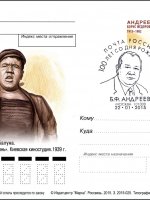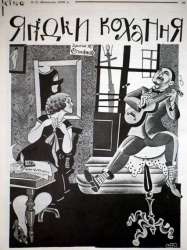Alexandre Dovjenko is a Director, Scriptwriter, Producer and Editor Russe born on 10 september 1894 at Sosnytsia (Ukraine)
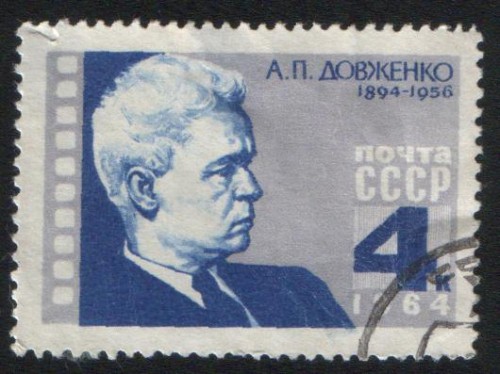
Alexander Petrovich Dovzhenko (Ukrainian: Олександр Петрович Довженко, Oleksandr Petrovych Dovzhenko; Russian: Алекса́ндр Петро́вич Довже́нко, Aleksandr Petrovich Dovzhenko; September 10 1894 – November 25, 1956),
was a Soviet screenwriter, film producer and director of Ukrainian origin.
He is often cited as one of the most important early Soviet filmmakers, alongside Sergei Eisenstein and Vsevolod Pudovkin, as well as being a pioneer of Soviet montage theory.
Although his parents were uneducated, Dovzhenko's semi-literate grandfather encouraged him to study, leading him to become a teacher at the age of 19. He escaped military service during both World War I and the Russian Revolution because of a heart condition, but did join the Communist Party in the early 1920s. He even served as an assistant to the Ambassador in Warsaw as well as Berlin. Upon his return to USSR in 1923, he began illustrating books and drawing cartoons in Kharkiv.
Dovzhenko turned to film in 1926 when he landed in Odessa. His ambitious drive led to the production of his second-ever screenplay, Vasya the Reformer (which he also co-directed). He gained greater success with Zvenyhora in 1928 which established him as a major filmmaker of his era. His following "Ukraine Trilogy" (Zvenigora, Arsenal, and Earth), although underappreciated by some contemporary Soviet critics (who found some of its realism counter-revolutionary), is his most well-known work in the West. For his film Shchors, Dovzhenko was awarded the Stalin Prize (1941); eight years later, in 1949, he was awarded another Stalin Prize for his film Michurin.
Dovzhenko served as a wartime journalist for the Red Army during World War II. After spending several years writing, co-writing and producing films at Mosfilm Studios in Moscow, he turned to writing novels. Over a 20 year career, Dovzhenko personally directed only 7 films.
He was a mentor to the young Soviet filmmakers Larisa Shepitko and Serhiy Paradzhanov. Dovzhenko died of a heart attack on November 25, 1956 in his dacha in Peredelkino. His wife, Yulia Solntseva continued his legacy by producing films of her own and completing projects Dovzhenko was not able to create.
The Dovzhenko Film Studios in Kiev were named after him in his honour following his death.
Source : Wikidata
Alexandre Dovjenko

Birth name Alexander Petrovich Dovzhenko
Nationality Russie
Birth 10 september 1894 at Sosnytsia (Ukraine)
Death 25 november 1956 (at 62 years) at Moscow (Russie)
Awards Народны артыст РСФСР, Order of Lenin, State Stalin Prize, Order of the Red Banner
Nationality Russie
Birth 10 september 1894 at Sosnytsia (Ukraine)
Death 25 november 1956 (at 62 years) at Moscow (Russie)
Awards Народны артыст РСФСР, Order of Lenin, State Stalin Prize, Order of the Red Banner
was a Soviet screenwriter, film producer and director of Ukrainian origin.
He is often cited as one of the most important early Soviet filmmakers, alongside Sergei Eisenstein and Vsevolod Pudovkin, as well as being a pioneer of Soviet montage theory.
Biography
Alexander Dovzhenko was born in the district of Viunyshche in Sosnytsia, a townlet located in the Russian Empire (now in the Chernihiv Oblast in Ukraine), to Petro Semenovych Dovzhenko and Odarka Ermolaivna Dovzhenko. His paternal ancestors were Cossacks who settled in Sosnytsia in the eighteenth century, coming from the neighbouring province of Poltava. Alexandr was the seventh of fourteen children, but due to the horrific rate of child loss he became the oldest child by the time he turned eleven (only Alexandr and his sister Polina survived).Although his parents were uneducated, Dovzhenko's semi-literate grandfather encouraged him to study, leading him to become a teacher at the age of 19. He escaped military service during both World War I and the Russian Revolution because of a heart condition, but did join the Communist Party in the early 1920s. He even served as an assistant to the Ambassador in Warsaw as well as Berlin. Upon his return to USSR in 1923, he began illustrating books and drawing cartoons in Kharkiv.
Dovzhenko turned to film in 1926 when he landed in Odessa. His ambitious drive led to the production of his second-ever screenplay, Vasya the Reformer (which he also co-directed). He gained greater success with Zvenyhora in 1928 which established him as a major filmmaker of his era. His following "Ukraine Trilogy" (Zvenigora, Arsenal, and Earth), although underappreciated by some contemporary Soviet critics (who found some of its realism counter-revolutionary), is his most well-known work in the West. For his film Shchors, Dovzhenko was awarded the Stalin Prize (1941); eight years later, in 1949, he was awarded another Stalin Prize for his film Michurin.
Dovzhenko served as a wartime journalist for the Red Army during World War II. After spending several years writing, co-writing and producing films at Mosfilm Studios in Moscow, he turned to writing novels. Over a 20 year career, Dovzhenko personally directed only 7 films.
He was a mentor to the young Soviet filmmakers Larisa Shepitko and Serhiy Paradzhanov. Dovzhenko died of a heart attack on November 25, 1956 in his dacha in Peredelkino. His wife, Yulia Solntseva continued his legacy by producing films of her own and completing projects Dovzhenko was not able to create.
The Dovzhenko Film Studios in Kiev were named after him in his honour following his death.
Usually with
Filmography of Alexandre Dovjenko (12 films)
Director
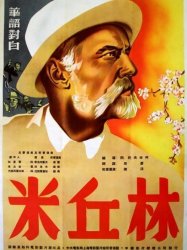
Life in Bloom (1949)
, 1h39Directed by Alexandre Dovjenko
Genres Drama, Biography
Actors Serge Bondartchouk, Iouri Lioubimov, Viktor Khokhryakov, Mikhail Zharov, Alekseï Konsovski, Klara Loutchko
Rating57%





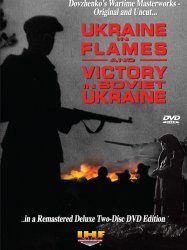
Ukraine in Flames (1943)
, 1h20Directed by Alexandre Dovjenko, Yuliya Solntseva
Genres Documentary
Themes Documentary films about war, Documentary films about historical events, Political films, Documentary films about World War II
Rating67%






Shors (1939)
, 1h32Directed by Alexandre Dovjenko, Yuliya Solntseva
Genres Drama, Historical
Themes Documentaire sur une personnalité, Documentary films about politics, Political films
Actors Yevgeny Samoylov, Nikolai Kryuchkov
Rating60%






Aerograd (1935)
, 1h22Directed by Alexandre Dovjenko
Genres Drama, Science fiction
Themes Transport films, Aviation films
Rating59%





A Russian outpost in Eastern Siberia comes under threat of attack by the Japanese in this patriotic film from 1935. Aerograd is a new town with a strategically located airfield of vital interest to the government. Work on the new outpost is complicated when tensions develop between workers and a religious sect. The sect threatens to give their support to a band of marauding samurai warriors who battle for control of the region. Relations between the two countries are further strained in the days before World War II, dating back to the Russo-Japanese War of 1905. In this feature, the Russians are victorious as airplanes throughout the country come to the aid of the beleaguered new town. Director Alexander Dovzhenko, long considered a giant in Russian classic cinema, also wrote the screenplay for this feature.

Earth (1930)
, 1h15Directed by Alexandre Dovjenko, Yuliya Solntseva
Origin Russie
Genres Drama
Themes Films about the labor movement
Actors Yuliya Solntseva
Rating71%





The film begins with the final moments of grandfather Semyon (Simon) Opanas beneath a pear tree. Next local kulaks, including Arkhyp Bilokin, contemplate the process of collectivization and declare their resistance to it, while elsewhere Semyon's grandson Vasyl (Basil) and his komsomol friends also meet to discuss collectivization, although his father is skeptical.

Arsenal (1929)
, 1h13Directed by Alexandre Dovjenko
Origin Russie
Genres Drama, War
Themes Politique, Political films
Actors Luciano Albertini, Amvrossi Boutchma
Rating70%





Après la révolution russe de 1917, la bourgeoisie tient les rênes du pouvoir dans une Ukraine désormais indépendante. En janvier 1918, pour défendre leurs idéaux, les bolcheviks lancent une grève qui paralyse Kiev, la capitale. La révolte des ouvriers de l'arsenal va y être réprimée dans le sang.
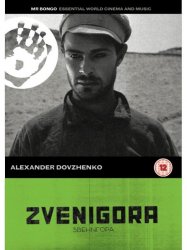
Zvenygora (1928)
, 1h31Directed by Alexandre Dovjenko
Origin Russie
Genres Drama, Comedy, Fantasy, Historical
Rating70%





Le film est constitué de douze épisodes, dont chacun raconte l'un des moments clés de l'histoire ukrainienne, depuis l'époque des Varègues à la guerre civile russe et la révolution d'Octobre. Les épisodes sont présentés sous la forme d'un rêve surréaliste et sont unis par la figure du grand-père.
Scriptwriter

The Enchanted Desna (1964)
, 1h41Directed by Yuliya Solntseva
Genres Drama, War, Fantasy
Actors Boris Andreyev, Yevgeny Samoylov, Ivan Pereverzev
Rating71%





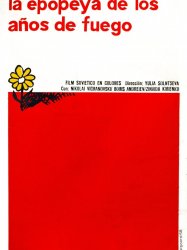
Chronicle of Flaming Years (1961)
, 1h31Directed by Yuliya Solntseva
Origin Russie
Genres Drama, War
Actors Boris Andreyev, Vladimir Zeldin, Zinaïda Kirienko, Vasili Merkuryev, Boris Novikov, Maïa Boulgakova
Rating66%





1941, début de la Grande guerre patriotique, le kolkhozien Ivan Orliouk, originaire des bords du Dniepr, devient soldat. Il participe aux premières batailles sur les rives du fleuve, avant d'atteindre Berlin. De retour au pays, il reprend les semailles sur la terre libérée.

Life in Bloom (1949)
, 1h39Directed by Alexandre Dovjenko
Genres Drama, Biography
Actors Serge Bondartchouk, Iouri Lioubimov, Viktor Khokhryakov, Mikhail Zharov, Alekseï Konsovski, Klara Loutchko
Rating57%






Ukraine in Flames (1943)
, 1h20Directed by Alexandre Dovjenko, Yuliya Solntseva
Genres Documentary
Themes Documentary films about war, Documentary films about historical events, Political films, Documentary films about World War II
Rating67%






Shors (1939)
, 1h32Directed by Alexandre Dovjenko, Yuliya Solntseva
Genres Drama, Historical
Themes Documentaire sur une personnalité, Documentary films about politics, Political films
Actors Yevgeny Samoylov, Nikolai Kryuchkov
Rating60%






Aerograd (1935)
, 1h22Directed by Alexandre Dovjenko
Genres Drama, Science fiction
Themes Transport films, Aviation films
Rating59%





A Russian outpost in Eastern Siberia comes under threat of attack by the Japanese in this patriotic film from 1935. Aerograd is a new town with a strategically located airfield of vital interest to the government. Work on the new outpost is complicated when tensions develop between workers and a religious sect. The sect threatens to give their support to a band of marauding samurai warriors who battle for control of the region. Relations between the two countries are further strained in the days before World War II, dating back to the Russo-Japanese War of 1905. In this feature, the Russians are victorious as airplanes throughout the country come to the aid of the beleaguered new town. Director Alexander Dovzhenko, long considered a giant in Russian classic cinema, also wrote the screenplay for this feature.
 Connection
Connection


